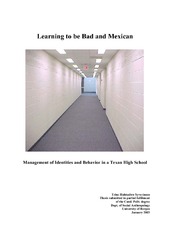| dc.description.abstract | The material for this thesis has been collected through fieldwork among Mexican-American kids, Mexicans in this thesis, in Austin, Texas in the USA, during the period from June to December 1999. During this period I visited one public high school, to be referred to as Anglo High in this thesis, daily from August to October, and then irregularly after that. The reason why visits became more infrequent after late-October was that the social work organization, SWO in this thesis, closed its office at Anglo High after this date. This office was where I was conducting the majority of the conversations with the kids who provide most of the voices for this thesis. From October, and throughout the remaining period, I started visiting a different high school, Charter School in this thesis, instead. The material collected here will sometimes be used independently, and sometimes as a contrast to observations made at Anglo High. This thesis seeks to explore how school authorities at Anglo High attempt to manage and control kids in general, and my Mexican kids in particular, both through actual surveillance and monitoring, and through the ascription of negative and confining identities. I want to analyze control as something that is both externally applied, through both a moral and a disciplinary gaze, and as something that is internalized in kids, through execution of the power to either directly label individual or group identities, or that of providing a limited number of options for choosing individual or group identities. In addition, this thesis also addresses how my Mexican kids interact with each other, and how they react and respond to school staff and their physical surveillance and identity labeling. I want to argue that both the ascription and management of identities and the perceived need for control, should be understood with reference to an American ideological and moral assessment of what constitutes risk both in dealing with minorities and with kids. Simplified, this thesis deals with relatively poor minority kids, and with how rich majority adults treat them. I hope that it will shed some light on questions regarding, both poverty, ethnicity and youth in America today, and I will go some way in suggesting that these three factors are all to various degrees ascribed with a moral value, and that possession of several negative identities can be seen to have an accumulative effect on perceived and ascribed Badness. | en_US |
